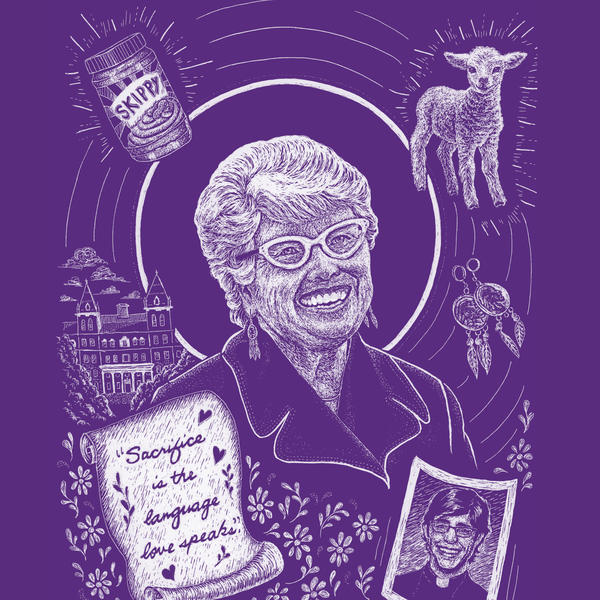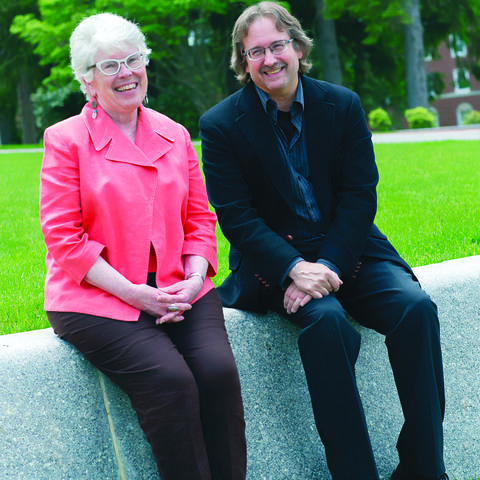Or, more precisely, the world and the Church need people — need religious, need Jesuits — who are so satisfied in God, so full of real love, that riches don’t tempt them in the same way. People who can credibly proclaim the Good News to those who have only one little ewe lamb, while at the same time calling to account those rich men who might be tempted to steal. I fear we Jesuits still have a long way to go with respect to this vision, but it remains before our eyes — a moving, compelling and evangelically necessary ideal for all.
Second, during the process of co-authoring her commentary on the Book of Ruth (with current Holy Cross Hebrew Bible professor Mahri Leonard-Fleckman), Alice would recite to me a line that she said she’d hoped to include in the text but — for editorial reasons, she told me — was cut: “Sacrifice is the language love speaks.”
One might — and Alice no doubt would — see this short line as an encapsulation of the entirety of the Christian life: sacrificial love, the language spoken on and from the Cross. But Alice saw the phrase as neither a Christian platitude nor the basis for a systemic theology. It was, rather, her summary of the Book of Ruth, in which the female protagonist chooses to stay and live with her mother-in-law, Naomi, after the death of the former’s husband and the latter’s son. Naomi tries to send Ruth back to Moab, to her people, where she might more easily find another husband and, thus, sustenance. But Ruth simply refuses: v’Rut davkah bah, the text says, “but Ruth cleaved to her,” to Naomi. “Wherever you go, I will go; wherever you live, I will live; your people shall be my people, and your God my God” (see Ruth 1).
And when the two return to Judah, Ruth becomes Naomi’s steadfast support, gleaning for her — that is, harvesting the grain picked over and left over by the formal reapers, in accord with Jewish law — and assuring that Naomi, a widow of precarious social standing, would not starve. In the end, of course, Ruth marries Boaz, the owner of the fields from which she gleaned, giving both women some measure of economic and agrarian security. Ruth and Boaz’s son, Obed, becomes the grandfather of King David, and (according to the Gospels of Matthew and Luke) the ancestor of Jesus. Obed — “servant” — who was half-Judahite, half-Moabite. Obed, the fruit of redemption after famine and death. Obed, the gift of his mother’s fidelity and love.
I can’t help but think that Ruth was, for Alice, a mentor and model: Alice, who cleaved to so many — who showed such great love for her students, for her friends and for the poor. One for whom accepting relationship with God meant concretely caring for people, for those God loved, without counting the cost. One for whom feeding people was a sine qua non of love.
Which brings me to one final memory I’d like to share, concerning a particular jar of peanut butter. Not long after my graduation from Holy Cross — and after the successful completion of my honors thesis that Alice shepherded — I was visiting Alice’s house before joining a Holy Cross immersion trip to El Salvador. Alice handed me a jar of peanut butter — Skippy, if memory serves. I might need protein, she said. And, if memory serves, I threw the jar in my comically large suitcase.
It seems a bit ludicrous in hindsight, bringing a jar of peanut butter for a week-long trip to Central America. But there was no question that I’d accept the gift, that I would play Naomi to her Ruth for neither the first nor last time, as many a student had — a radical token of care in the twilight of my Holy Cross career. And, as I think about Alice, her life and her work — her ministry — I imagine that someone hearing this peanut butter anecdote might justly respond: Who does that? But no one who knew Alice Laffey would be the least bit surprised. May her memory be a blessing, and may perpetual light shine upon her.



